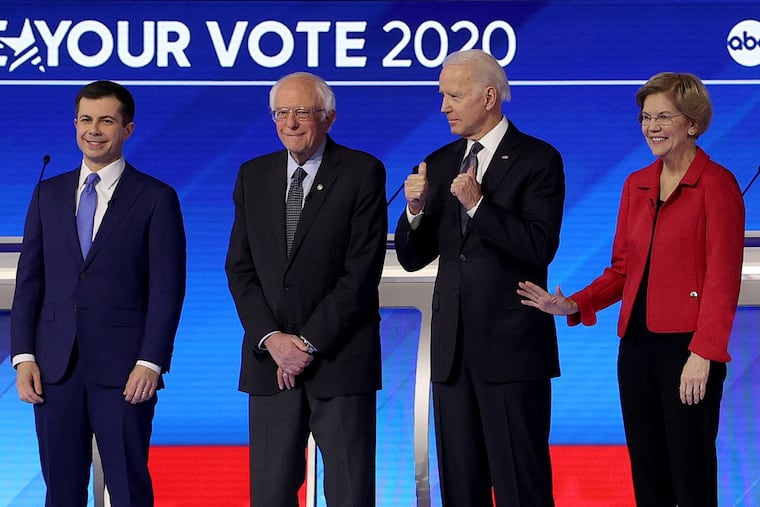Thousands of Pennsylvanians gave money to more than one 2020 candidate. See what that overlap looks like.
As they poured money into Democratic campaigns for president last year, more than one in five Pennsylvania donors gave to multiple 2020 candidates.

Pennsylvania donors are sharing the love.
As they poured money into Democratic campaigns for president last year, to the tune of almost $14.4 million, more than one in five donors gave to multiple candidates.
And for however chaotic the primary has been, and as deep as the ideological fault lines may appear, many donors have been willing to financially back more than one campaign. Their giving patterns complicate common narratives about progressive and moderate “lanes” as candidates put forward competing visions of the party.
For example, about 16% of former South Bend, Ind., Mayor Pete Buttigieg’s Pennsylvania donors — or one in six — also gave money to Sen. Elizabeth Warren of Massachusetts, making her the most popular overlapping candidate among Buttigieg supporters.
That’s despite the perception of Buttigieg as a moderate closer to the mold of former Vice President Joe Biden, in contrast to Warren, who, with Sen. Bernie Sanders of Vermont, leads the more progressive candidates in the race. The overlap between Warren and Buttigieg donors is more than twice as large as the overlap between Warren and Biden donors.
Overlap isn’t necessarily a sign of political weakness, either. The fact that Sanders has a massive group of donors who give only to him, while a significant number of Warren donors also contribute to others, could bolster Warren’s argument that she can ultimately be a unifying candidate for the party.
Ideological connections do matter: Warren and Sanders donors overlap most with each other, and Biden donors most commonly also give to Buttigieg. But the connections don’t always fall cleanly between progressive or moderate candidates. Surprising connections also exist with lower-tier candidates, including ones who have dropped out.
It’s become easier than ever to give small amounts to multiple candidates, thanks to a rise in online tools that make it nearly frictionless for everyday people to join the donor class.
Democratic campaigns this election cycle have sought to aggressively grow their pool of small-dollar donors, taking advantage of the online platform ActBlue, and heeding lessons from Sanders’ 2016 campaign about the power of an army of small donors.
Sanders has repeated that approach to great effect — he has many more Pennsylvania donors than anyone else — and Warren has adopted the tactic, too. Both are eschewing traditional fund-raisers.
Biden, meanwhile, has relied on major donors and traditional big-check fund-raising events, though the campaign also has sought to broaden its financial base. Buttigieg has courted large-dollar donors while also raising substantial sums from small-dollar donors.
The Democratic Party has leaned into the new fund-raising reality, requiring candidates to raise money from large numbers of donors to qualify for debates last year. That has made desperate fund-raising appeals a regular part of the 2020 election cycle, with emails, text messages, and social media posts begging supporters to donate as little as $1 to help candidates meet debate-stage requirements.
While a majority of Pennsylvania donors give to only one candidate, almost 34,000 gave to more than one.
An Inquirer analysis of federal campaign-finance filings reveals very different donor pools among the candidates, including the four candidates in the top tier, both nationally and in Pennsylvania. Sanders, for example, has the largest number of Pennsylvania donors and the highest degree of loyalty, while Warren has the second-largest donor base in the state, but almost half of her backers have also given money elsewhere.
Buttigieg and Biden have smaller overall donor pools than Warren and Sanders, and Buttigieg has fewer exclusive donors than Biden has.
Andrew Yang, Marianne Williamson, and Tulsi Gabbard also had highly loyal donor bases in Pennsylvania last year.
But Sanders leads the pack. And Adam Grimes, 37, of Parkesburg in Chester County, helps show why. He’s been donating $10 a month to the Sanders campaign for the last seven months. Through ActBlue, the campaign automatically charges his card once a month.
Grimes, a Marine Corps veteran who served in Iraq, cited as key selling points Sanders’ support for a single-payer health-care system and his efforts to root out corruption and big money in politics. He said he also feels “a personal debt of gratitude” to Sanders for his cosponsoring of the 2008 post-9/11 GI Bill, which Grimes said helps pay for his education. He’s pursuing two engineering degrees at Drexel.
“His campaign is much less about identity and much more about how he’s going to help the average American, especially the average American worker,” Grimes said.
“I’m gonna keep that monthly money flowing,” he added. “Hopefully, it’ll help him out.”
In a sign of the power of those appeals for small donations, some candidates had a significant number of donors who gave a total of $5 or less.
Consider Adam Dusen, 35, an organic farmer from Buckingham Township in Bucks County. He said he makes an automatic contribution of $2.70 a month to the Sanders campaign and sometimes chips in more near fund-raising deadlines.
“We don't make a lot of money in my household,” he said. “At least that much I know I can contribute.”
Dusen said Sanders was the only candidate “who is really intent on trying to reform what is broken about politics in our country.” But he also gave $1 to former U.S. Sen. Mike Gravel’s campaign to try to help him get on the debate stage. Gravel dropped his quixotic bid in August and endorsed Sanders.
Staff writer Andrew Seidman contributed to this article.